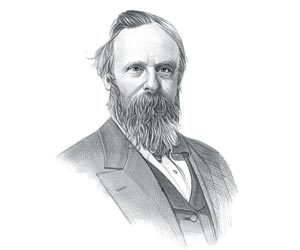|
President Rutherford Hayes represented the Republican political party which influenced the domestic and foreign policies of his presidency. The major accomplishments and the famous, main events that occurred during the time that Rutherford Hayes was president included the Compromise of 1877 and the End of Reconstruction. Other important events included Civil Service Reforms, the Bland-Allison Act (1878) and initiating the American controlled canal in Panama. Rutherford Hayes died on January 17, 1893 of heart disease, aged 70. The next president was James Garfield.
Birthday: October 4, 1822
Place of Birth: Ohio
Political Party: Republican
Nickname: Rutherfraud
Number: 19th President
Vice President: William A. Wheeler
Age at Inauguration: 54
Height: 5 feet 9 inches
Weight: 170 pounds
First Lady: Lucy Webb Hayes
Religion: No religious affiliation
Date of Death: January 17, 1893
Date of Rutherford Hayes Presidency:
March 4, 1877 to March 4, 1881
The Nickname of Rutherford Hayes: Rutherfraud
The nickname of President Rutherford Hayes provides an insight into how the man was viewed by the American public during his presidency. The meaning of the nickname "Rutherfraud" and "His Fraudulency" refers to the derogatory name given by Democrats who believed that he had used unfair means to steal the 1876 presidential election.
Character and Personality Type of Rutherford Hayes
The character traits of President Rutherford Hayes can be described as outgoing, gregarious, relaxed and straight-laced - he did not drink, smoke or gamble. It has been speculated that the Myers-Briggs personality type for Rutherford Hayes is an ENTP (extroversion, intuition, thinking, perception). An outgoing character with a strong desire to improve the world they live in. Rutherford Hayes Personality type: Loyal, innovative, flexible, rational and resourceful.
Accomplishments of Rutherford Hayes and the Famous Events during his Presidency
The accomplishments of Rutherford Hayes and the most famous events during his presidency are provided in an interesting, short summary format detailed below.
The Compromise of 1877 - End of Reconstruction
Summary of the Compromise of 1877: The The Compromise of 1877 was a deal between Democrats and Republicans settled the disputed 1876 U.S. Presidential election in favor of Rutherford Hayes, restored " Home Rule" in the South and ended Reconstruction.
Great Railroad Strike of 1877
Summary of the Great Railroad Strike of 1877: The Great Railroad Strike of 1877 started on the Baltimore and Ohio line at Maryland on July 14, 1877 over pay cuts during an economic depression. The Great Railroad Strike of 1877 lasted under one month and was the first nationwide strike in the United States.
The Great Migration of the Exodusters
Summary of the Exodusters: The Great Migration of the Exodusters involved the mass migration of African Americans to Kansas, that following the Homestead Act was open for settlement that began in 1879. The Exodusters were led by a former slave called Benjamin "Pap" Singleton to escape racism and segregation practices in the south and intimidation by white supremacists such as the Ku Klux Klan.
Rise of Big Business and Corporations
Summary of the Rise of Big Business and Corporations: The Rise of Big Business and Corporations using unfair business practices began to escalate during the presidency of Rutherford Hayes. Large corporations eliminated many smaller companies, became extremely powerful and were able to influence social and political policies in the United States. The Big Businesses and Corporations used their influence to extract favorable legislation and gave little concern for working conditions which led to social unrest including riots and strikes and the rise of labor Unions.
Captains of Industry
Summary of the Captains of Industry: The Captains of Industry was the term applied to the entrepreneurs and inventors who made a positive impact on America during the late 1800's. Some of the men perceived as 'Captains of Industry' used unfair practises to reach the top and these more unscrupulous men were also called Robber Barons.
The Robber Barons
Summary of the Robber Barons: The Robber Barons was the nickname given to ruthless American Capitalists who made a negative impact on America during the late 1800's. The ruthless and greedy Robber Barons used unethical business practices and unscrupulous tactics to build monopolies with a total disregard for their workers, their customers or their competitors.
|

